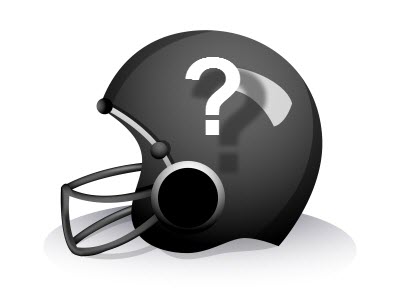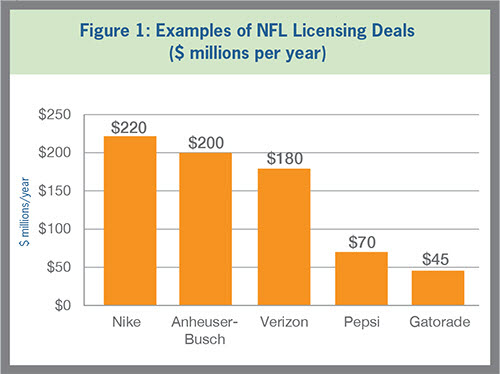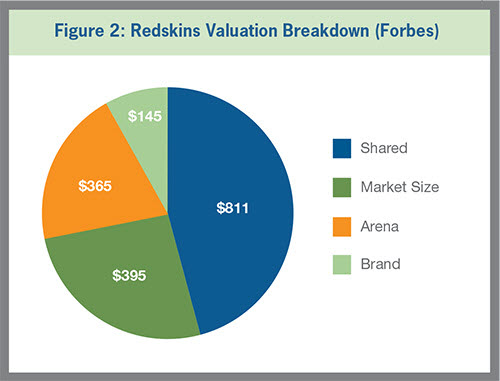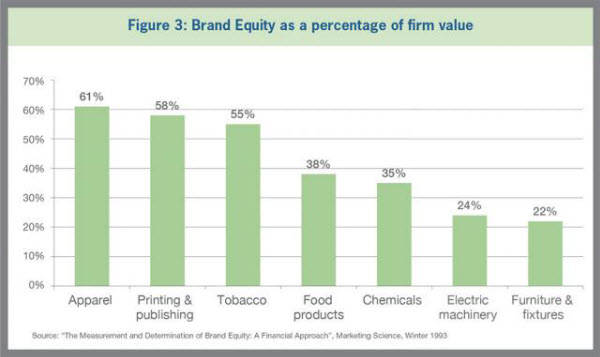Hail to the…Redskins?
How the Trademark Trial and Appeal Board’s Cancellation of a Historic Mark Impacts Brand Value and the NFL
On June 18, 2014, the Trademark Trial and Appeal Board canceled the federal registration for six Redskins trademarks. In this article, the authors discuss the impact that the cancellation of the trademark may have on the brand, NFL’s revenue sharing, and the value of the Redskins franchise. The authors also outline the options available to the Redskins’ team owner.
Introduction
The Washington Redskins (“Redskins”) of the National Football League (“NFL”) own some of the most recognizable and valuable trademarks in the world. However, on June 18, 2014, the Trademark Trial and Appeal Board (“TTAB”) cancelled the federal registrations for six of the Redskins’ trademarks, potentially jeopardizing the value of the Redskins brand. The TTAB, a body of the United States Patent and Trademark Office (“USPTO”), cancelled the trademarks because they were “disparaging to Native Americans at the respective times they were registered.”1 The cancellation ruling only applies to trademarks bearing the name “Redskins.” The American Indian Chief logo, stamped on the players’ helmets and the middle of FedEx Field, is still protected.2
Valued at $2.4 billion,3 the Redskins are the seventh most valuable sports team in the world and the third most valuable team in the NFL behind the Dallas Cowboys and New England Patriots.4 All of the NFL’s 32 franchises, which share revenues from broadcasting and licensing deals, fall in Forbes’ top 52 most valuable sports teams.5 According to John Vrooman, the author of The Economic Structure of the NFL, “Over the last half-century the National Football League (NFL) has become the most economically powerful sports league in the world largely because it has also been the most egalitarian.”6 Given this revenue-sharing arrangement, the TTAB’s ruling has the potential to financially impact not only the Redskins franchise, but the entire NFL.
This is not the first time the TTAB has made an adverse ruling with regard to the Redskins’ trademark registrations. In 1999, the Redskins’ trademark registrations were cancelled under the same disparagement provision of the Lanham Act.7 On appeal in 2003, the D.C. District Court reversed the TTAB’s decision and, in 2009, the reversal of the TTAB’s cancellation was upheld by the D.C. Circuit.8 In 2006, five Native Americans filed a new case requesting that the TTAB cancel the Redskins’ trademark registrations, which led to the recent TTAB ruling.9
NFL Dollars — What’s At Stake?
According to Forbes, the average NFL team earns $299 million in revenue per year, and $53 million in profit per year.10 The Redskins are well above the average, generating $395 million in revenue and $143 million in profit per year.11
Jeffrey S. Phillips, Head of SRR’s Transaction Opinion practice, has extensive experience in providing valuation opinions for professional sports teams, including the NFL. According to Mr. Phillips, while NFL team revenues come from a variety of sources, more than half of all revenues are attributable to a shared NFL pot, comprised mostly of national broadcasting and licensing deals. Furthermore, “Market size and performance do not matter to the pool of national revenues — all teams get an equal share. Any impact on the Redskins impacts the whole NFL. It’s a fairly socialistic league. From a revenue perspective, the primary impact of the TTAB’s decision will be felt in the shared licensing revenues.”
Within the shared pot of revenues, licensing deals for the NFL are very lucrative.12 See Figure 1. Nike, one of many licensees to NFL trademarks, reportedly paid $1.1 billion in 2012 to be the league’s official uniform provider for five years.13 Payments from Nike, along with other apparel and headwear licensees, make up nearly half of the royalties generated from NFL licensed goods.14 Royalty revenues from these merchandise sales are most likely to be affected by the TTAB’s decision. Without federal trademark protection, it is possible that unlicensed sources could begin to sell unauthorized “Redskins” products with impunity.
In addition to the shared pot of revenues, Mr. Phillips says that each team generates local revenues through some combination of the sale of tickets, suites, sponsorships and naming rights, local pre-season television and radio deals, concessions, parking, programs, novelties, and merchandise. The TTAB’s decision could directly impact the Redskins’ local revenues, primarily those generated from merchandise sales. The combination of potential losses in the shared pot and local revenues could amount to millions of dollars.15
Impacts of the Cancellation
It is important to note that even if the Redskins lose their trademark registrations, the franchise is still permitted to use the name, albeit without federal trademark protection.16 In addition, the franchise will retain the right to pursue damages from non-licensed entities that use the Redskins trademarks; the team can argue that it has a common-law claim by virtue of having used the name for so long.17
Nevertheless, the TTAB’s decision poses two serious threats to the Redskins organization. First, if the cancellation is affirmed by a federal court, or if the franchise fails to appeal — a highly unlikely outcome — the team would lose certain legal protections conferred by federal trademark registration. Second, even if the TTAB’s ruling is reversed, the decision has spurred a national debate revealing mounting public opinion against the continued use of the team name. If sales of licensed Redskins merchandise become diluted due to an influx in unauthorized merchandise, or decrease due to deteriorating public opinion, all NFL franchises18 stand to lose revenues.
Unauthorized Merchandise
The loss of legal protections afforded by federal trademark registration may significantly impact the market for counterfeit goods. Such sales plague the NFL to the tune of billions of dollars every year.19 Agencies like the U.S. Immigration and Customs Enforcement (“ICE”) and the U.S. Customs and Border Protection (“CBP”) are required to block the import of non-sanctioned merchandise that bears federally registered trademarks.20 These federal agencies play a large role in combating counterfeit NFL goods; in the second half of 2013 alone, they seized more than $21 million in fake NFL merchandise and shut down more than 5,000 e-commerce websites.21 If the Redskins lose their federal trademark protection, counterfeit merchandise sales could increase at the expense of legitimate merchandise sales — an effect that would be felt by all NFL franchises.22
Market Backlash
When faced with trademark cancellation over a decade ago, the Redskins fought the decision in court. While the team has promised to do the same this time around,23 public opinion on the issue is more contentious than in the early 2000s. Notable figures — including President Barack Obama, members of Congress, the D.C. Council, and several high-profile sportscasters and journalists — have voiced their opposition to the continued use of the team name.24 In May of 2014, half of the Senate wrote letters to the NFL urging a change.25 Additionally, some shareholders of FedEx, sponsor and owner of the stadium naming rights, have asked the company to consider the reputational risk of holding the naming rights to the field.26
As the Los Angeles Clippers organization recently discovered when team owner Donald Sterling’s racist comments were publicized, public opinion can quickly force an organization to make institutional changes. If the public dissent against the use of the “Redskins” name continues to grow, the franchise and the NFL may have no choice but to change the name, less it risk the hundreds of millions of dollars generated by the team every year.
What’s In a Name?
A trademark, according to the International Trademark Association (“INTA”), “may be any word (XEROX), name (GIORGIO ARMANI), slogan (GOT MILK?), symbol (McDonald’s golden arches), device (the Pillsbury Doughboy), package design (Coca-Cola bottle), or combination of these that serves to identify and distinguish a product from others in the marketplace and identify it with its source.”27
The Redskins long-standing trademarks — some registered half a century ago28 — are some of the franchise’s most valuable assets. Approximately half of the Redskins’ $2.4 billion valuation, according to Forbes, is attributable to revenue shared amongst all teams. The other half is comprised of the Redskins’ market size ($550 million), stadium ($511 million), and “brand” ($214 million).29 See Figure 2.
While a “trademark” identifies the source of a particular product, a “brand” often signifies customer perceptions about the product or service.30 As is the case with the Redskins franchise, a company’s brand is often built on its collective trademarks, which can represent a large portion of its total value. Figure 3, created by the Marketing Science Institute, shows how much of a company’s value across various industries is made up by its brand.
According to David Haigh in his book Brand Valuation: Understanding, Exploiting and Communicating Brand Values, “A brand has the unique ability to transfer consumer loyalty between products, services and categories over time and to separate it from tangible production. The ability to franchise and license brands has enabled recognition of this intangible property as the most powerful and productive asset owned by modern business. For some commentators, it is this transferability of the brand between products that differentiates it from a trademark.”31
Brand owners are obviously interested in brand value. Although, as previously mentioned, the TTAB’s decision does not affect the Redskins’ ability to use its trademarks, it could certainly impact the organization’s image, as well as the Redskins’ ability to protect its trademarks, and therefore ultimately harm the brand’s value.
What Can the Redskins Do?
The Redskins can approach the TTAB’s cancellation in a number of ways. It is nearly certain the team will appeal the decision.32 The Redskins will retain federal trademark protection throughout the appeal process33 — and if the 10-year appeal of the 1999 decision34 is any indication, the Redskins will hold onto their trademark registrations for quite some time. However, even if the decision is overturned on appeal, the Redskins face a serious threat of market backlash from continued use of the name. To avoid a loss in fan base and potential boycott of the franchise, the Redskins organization has at least the following two alternatives.
Maintain the Status Quo
The team can refuse to change the name, as it did after the first TTAB trademark cancellation, and attempt to maintain the status quo. Early indications suggest the organization plans to do just this. When asked if he would ever consider changing the team name, team owner Daniel Snyder replied, “We’ll never change the name. It’s that simple. NEVER — you can use caps.”35 As a further indication of its intent to stick it out, the Redskins recently hired public relations firm Burson-Marsteller to battle criticism over the use of the team name.36
Change the Name
If the Redskins franchise does change its name, it could lose profits due to the dilution of its brand strength — a brand the team has spent years building. In addition, the Redskins would bear the costs of creating a new brand.
On the other hand, a name change could benefit the franchise. Changing the name could present a significant opportunity — “Redskins” gear would become collectors’ items, driving up prices in a fire sale fashion.37 The Redskins may likewise see an increase in profits due to an initial surge in sales of the team’s merchandise under its new name.
Allen Adamson, managing director of Landor Associates, the brand consulting firm that helped Andersen Consulting make the switch to Accenture, thinks a Redskins re-branding offers a significant opportunity for profit.38 He states, “It creates news … It creates interest. It will draw people in.” When asked whether the Redskins might risk losing fans with a name change, Adamson was not concerned: “Memories are short when you are in a monopoly market.”39
Controversial sports names are nothing new to the nation’s capital. In 1997, the National Basketball Association’s (“NBA”) Washington Bullets changed their name to the Washington Wizards as part of the team’s anti-violence campaign. Robert Pollin, the son of Abe Pollin (former owner of Bullets/Wizards team), wrote recently about the Washington Wizards and Redskins, “The [Wizards] would not be one iota better, nor would they have one more fan, if they were called the Bullets … Through making such a courageous decision, Snyder would earn the respect of his community and create a massive new wave of support for his football team.”40 Even after the Wizards name change, the organization still sold Bullets “throwback” merchandise.41 The once-Redskins, too, would likely offer throwback Redskins gear for years after the name change.
The Charlotte Bobcats franchise of the NBA is an example of a team that recently underwent a re-branding. The team announced in May 2013 plans to change its name to the Charlotte Hornets, a name the Charlotte team donned from 1988-2002.42 Although the re-branding cost the team at least $3 million, the cost was arguably outweighed by the benefits.43 After the announcement, ticket sales for the team increased 59 percent from the previous season and a number of new sponsorship deals were made.44 Even though new Hornets uniforms, logos, and other gear had not been unveiled, the team created two sub-brands — “Back the Buzz” and “Buzz City” — which were so popular the team had to secure additional inventory.45 Pete Guelli, the Hornets’ executive vice president and chief sales and marketing officer, said the move to re-brand opened up a number of doors that were previously closed.46
If the Redskins franchise does change its name, there are already a number of suggestions. Some of the more popular labels include the Washington: “Warriors,” “Pigskins,” “Hogs,” “Red Hawks,” “Redtails,” “Senators,” and “Renegades.”47 Although the Washington “Pigskins” organization might risk an initial setback, Allen Adamson says, “I think in the worst case it would be a break-even over a three- to five-year period.”48
Conclusion
According to the Washington Business Journal, “The [Redskins franchise is] a key cog in the region’s economy. It has an 82-year history and hundreds of thousands of rabid fans, many of whom disagree on whether the team name needs to change.”49 While the eventual impacts of the TTAB’s decision may be large, both to the Redskins and other NFL teams, neither are likely to feel a direct financial impact of the ruling any time soon. However, even if the team ultimately changes its name, there may be a silver lining to this storm cloud — if executed properly, plenty of those hundreds of thousands of rabid fans will be looking for new licensed merchandise.
Michele M.. Riley is a managing director with Stout Risius Ross’ Washington, DC office. She co-leads the SRR intellectual property practice and is responsible for providing a variety of consulting services, with a focus on intellectual property damages and valuation. Ms. Riley can be reached at mniley@srr.com or at (202) 370-2409.
Duke J. Schaeffer is a senior analyst, Dispute Advisory and Forensic Services, with Stout Risius Ross, Inc. and is also based in Washington, DC. Mr. Schaeffer can be reached at rschaeffer@srr.com or by calling (202) 370-2409.
1 United States Patent and Trademark Office Trademark Trial and Appeal Board, Cancellation No. 92046185 in Amanda Blackhorse, Marcus Briggs-Cloud, Philip Gover, Jillian Pappan, and Courtney Tsotigh v. Pro-Football, Inc., 18 June 2014, 2. Specifically, the TTAB ruled that these trademarks were in violation of Section 2(a) of the Lanham Trademark Act.
2 Ken Belson and Nick Corasaniti, “Redskins Trademark: A Primer on the Cancellation,” The New York Times, 18 June 2014, http://www.nytimes.com/2014/06/19/sports/football/redskins-trademark-a-primer-on-the-cancellation.html?_r=0 (accessed 25 July 2014).
3 Forbes, “NFL Team Values, The Business of Football,” Aug. 2014, http://www.forbes.com/nfl-valuations/list/ (accessed 9 Sept. 2014).
4 Forbes, “NFL Team Values, The Business of Football,” Aug. 2014, http://www.forbes.com/ nfl-valuations/list/ (accessed 9 Sept. 2014); Forbes, “Soccer Team Values, Business on the Pitch,” May 2014, http://www.forbes.com/soccer-valuations/list/ (accessed 9 Sept. 2014); Forbes, “MLB Team Values, The Business of Baseball,” March 2014, http://www.forbes.com/mlb-valuations/list/ (accessed 9 Sept. 2014); Forbes, “NBA Team Values, The Business of Basketball,” Jan. 2014, http://www.forbes.com/nba-valuations/list/ (accessed 9 Sept. 2014); Forbes, “NHL Team Values, The Business of Hockey,” Nov. 2013, http://www.forbes.com/nhl-valuations/list/ (accessed 9 Sept. 2014).
5 Michael David Smith, “Sharing the wealth has made NFL owners the richest in the world,” NBC Sports, 16 July 2013, http://profootballtalk.nbcsports.com/2013/07/16/sharing-thewealth- has-made-nfl-owners-the-richest-in-the-world/ (accessed 25 July 2014).
6 John Vrooman, “The Economic Structure of the NFL,” Chapter 2 of The Economics of the National Football League: The State of the Art, K.G. Quinn (ed.) (Springer Science+Business Media, LLC 2012), 7, http://www.vanderbilt.edu/econ/faculty/Vrooman/ VROOMAN-NFL.pdf (accessed 25 July 2014).
7 Latham & Watkins, “Fine Timing For The Washington Redskins: ‘Racial Epithets’ As Trademarks,” Litigation Department, Client Alert Number 1526, 22 May 2013, http://www. lw.com/thoughtLeadership/washington-redskins-trademark (accessed 25 July 2014).
8 Gene Quinn, “Supreme Court Refuses Harjo, Redskins Can Keep Trademark” IPWatchdog, Inc., 16 Nov. 2009, http://www.ipwatchdog.com/2009/11/16/supremecourt-refuses-harjo-redskins-can-keep-trademark/id=7314/ (accessed 25 July 2014).
9 Latham & Watkins, “Fine Timing For The Washington Redskins: ‘Racial Epithets’ As Trademarks,” Litigation Department, Client Alert Number 1526, 22 May 2013, http://www.lw.com/thoughtLeadership/washington-redskins-trademark (accessed 25 July 2014).
10 Forbes, “NFL Team Values, The Business of Football,” Aug. 2014, http://www.forbes.com/nfl-valuations/list/ (accessed 9 Sept. 2014). Averages calculated by Stout Risius Ross.
11 Forbes, “Washington Redskins, NFL Team Valuations,” Aug. 2014, http://www.forbes.com/teams/washington-redskins/ (accessed 9 Sept. 2014). Revenue is net of stadium revenue used for debt payments; operating income is earnings before interest, taxes, depreciation and amortization.
12 CNN Money, “Inside the NFL’s $9.3 billion money machine,” 9 Mar. 2011, http://money.cnn.com/galleries/2011/news/1103/gallery.nfl_total_value.fortune/4.html (accessed 25 July 2014).
13 John Kell, “Nike Shows NFL Gear: League’s New Uniform Supplier Will Launch Consumer Line at End of April,” Wall Street Journal, 4 Apr. 2012, http://online.wsj.com/news/articles/SB10001424052702303816504577321743295501220 (accessed 25 July 2014).
14 Ken Belson, “Nike to Replace Reebok as N.F.L.’s Licensed-Apparel Maker,” The New York Times, 12 Oct. 2010 http://www.nytimes.com/2010/10/13/sports/football/13nike.html?_r=1& (accessed 25 July 2014).
15 Amanda Ciccatelli, “Washington Redskins trademark registration canceled,” InsideCounsel Magazine, 24 June 2014, http://www.insidecounsel.com/2014/06/24/washington-redskins-trademark-registration-cancele (accessed 25 July 2014).
16 Karen Gaunt and April Besl, “Trademark Takeaways From The Washington Redskins Case,” Law360, 19 June 2014, http://www.law360.com/articles/549468/trademark-takeaways-from-the-washington-redskins-case (accessed 25 July 2014).
17 Kavitha Davidson, “Redskins Can Lose Name or Lose Money,” BloombergView, 18 June 2014, http://www.bloombergview.com/articles/2014-06-18/redskins-can-lose-name-or-lose-money (accessed 25 July 2014).
18 With the exception of the Dallas Cowboys, who have their own merchandising deal. Ken Belson and Edward Wyatt, “Redskins Lose Ruling on Trademarks, but Fight Isn’t Over,” The New York Times, 18 June 2014, http://www.nytimes.com/2014/06/19/sports/football/us-patent-office-cancels-redskins-trademark-registration.html (accessed 25 July 2014).
19 Allan Brettman, “NFL, Nike fight to keep counterfeit products off the market,” OregonLive.com, 16 Nov. 2013, http://www.oregonlive.com/playbooks-profits/index.ssf/2013/11/nfl_nike_fight_to_keep_counter.html (accessed 25 July 2014).20 Ken Belson and Nick Corasaniti, “Redskins Trademark: A Primer on the Cancellation,” The New York Times, 18 June 18. 2014, http://www.nytimes.com/2014/06/19/sports/football/redskins-trademark-a-primer-on-the-cancellation.html?_r=0 (accessed 25 July 2014).
21 U.S Immigration and Customs Enforcement, “Federal agencies seize more than $21.6 million in fake NFL merchandise during ‘Operation Team Player’,” News Release, 30 Jan. 2014, http://www.ice.gov/news/releases/1401/140130newyork.htm (accessed 25 July 2014).
22 With the exception of the Dallas Cowboys, who have their own merchandising deal; Ken Belson and Edward Wyatt, “Redskins Lose Ruling on Trademarks, but Fight Isn’t Over,” The New York Times, 18 June 2014, http://www.nytimes.com/2014/06/19/sports/football/us-patent-office-cancels-redskins-trademark-registration.html (accessed 25 July 2014). Ken Belson and Nick Corasaniti, “Redskins Trademark: A Primer on the Cancellation,” The New York Times, 18 June 18. 2014, http://www.nytimes.com/2014/06/19/sports/football/redskins-trademark-a-primeron-the-cancellation.html?_r=0 (accessed 25 July 2014).
23 Amanda Ciccatelli, “Washington Redskins trademark registration canceled,” InsideCounsel Magazine, 24 June 2014, http://www.insidecounsel.com/2014/06/24/washington-redskinstrademark-registration-cancele (accessed 25 July 2014).
24 Mark Holan, “The Sponsors: From Team Partners, Just Silence” Washington Business Journal, Vol. 33, No. 10, 27 June 2014, 33; Theresa Vargas and Annys Shin, “President Obama says, ‘I’d think about changing’ name of Washington Redskins,” The Washington Post, 5 Oct. 2013, http://www.washingtonpost.com/local/president-obama-says-id-think-about-changing-nameof-washington-redskins/2013/10/05/e170b914-2b70-11e3-8ade-a1f23cda135e_story.html(accessed 25 July 2014).
25 Amanda Ciccatelli, “Washington Redskins trademark registration canceled,” InsideCounsel Magazine, 24 June 2014, http://www.insidecounsel.com/2014/06/24/washington-redskinstrademark- registration-cancele (accessed 25 July 2014).
26 Mark Holan, “The Stadium Name: Some Shareholders Upset with FexEx,” Washington Business Journal, Vol. 33, No. 10, 27 June 2014, 32.
27 International Trademark Association, “Introduction to Trademarks,” http://www.inta.org/TrademarkBasics/FactSheets/Pages/LearntheLanguageFactSheet.aspx (accessed 25 July 2014).
28 Ken Belson and Edward Wyatt, “Redskins Lose Ruling on Trademarks, but Fight Isn’t Over,” The New York Times, 18 June 2014, http://www.nytimes.com/2014/06/19/sports/football/uspatent-office-cancels-redskins-trademark-registration.html (accessed 25 July 2014).
29 Forbes, “Washington Redskins, NFL Team Valuations,” Aug. 2014, http://www.forbes.com/teams/washington-redskins/ (accessed 9 Sept. 2014).
30 Jerry McLaughlin, “What is a Brand, Anyway?” Forbes, 21 Dec. 2011, http://www.forbes.com/sites/jerrymclaughlin/2011/12/21/what-is-a-brand-anyway/ (accessed 25 July 2014).
31 Dr. Jennifer Davis, “Thevalue of trade marks: economic assets and cultural icons,” Chapter from
Intellectual Property: Bridging Aesthetics and Economics (Themis, University of
Montreal, Oct.2006), https://www.google.com/urlsa=t&rct=j&q=&esrc=s&source=web&cd=2&cad=rja&uact=8&ved=0CCgQFjAB&url=http%3A%2F%2Fwww.atrip.org%2FContent%2FActivities%2FDavis%2520Brandvalue.doc&ei=omjSU7uiBbLksATj0oHQDQ&usg=AFQjCNHsWa2Y4jQJA0FAFuoHL0W_fzz4xQ&sig2=e0aw9mE0dmuVvIYXD5X_
w&bvm=bv.71667212,d.cWc (accessed 25 July 2014).
32 Amanda Ciccatelli,
“Washington Redskins trademark registration canceled,” InsideCounsel Magazine,
24 June 2014,http://www.insidecounsel.com/2014/06/24/washington-redskins-trademark-registration-cancele (accessed 25 July 2014).
33 Ken Belson and Nick Corasaniti, “Redskins Trademark: A Primer on the Cancellation,” The New York Times, 18 June 18. 2014, http://www.nytimes.com/2014/06/19/sports/football/redskins-trademark-a-primer-on-the-cancellation.html?_r=0 (accessed 25 July 2014).
34 Bill Donahue, “Postgame: Drinker Biddle’s Witten Talks Redskins Win,” Law360, 24 June 2014, http://www.law360.com/articles/551106/postgame-drinker-biddle-s-witten-talks-redskins-win (accessed 25 July 2014).
35 Erik Brady, “Daniel Snyder says Redskins will never change name,” USA Today Sports, 10 May 2013, http://www.usatoday.com/story/sports/nfl/redskins/2013/05/09/washington-redskins-daniel-snyder/2148127/ (accessed 1 Aug. 2014).
36 John Clarke, “Redskins hire PR firm Burson-Marsteller amid fight over name,” Reuters, 30 July 2014, http://www.reuters.com/article/2014/07/30/us-nfl-redskins-burson-idUSKBN0FZ2FV20140730 (accessed 1 Aug. 2014).
37 Ken Belson and Nick Corasaniti, “Redskins Trademark: A Primer on the Cancellation,” The New York Times, 18 June 18. 2014, http://www.nytimes.com/2014/06/19/sports/football/redskins-trademark-a-primer-on-the-cancellation.html?_r=0 (accessed 25 July 2014).
38 Ira Boudway, “The Business Case for Changing the Name of the Washington Redskins,” Bloomberg Businessweek, 31 May 2013, http://www.businessweek.com/articles/2013-05-31/the-business-case-for-changing-the-name-of-the-washington-redskins (accessed 1 Aug. 2014).
39 Ira Boudway, “The Business Case for Changing the Name of the Washington Redskins,” Bloomberg Businessweek, 31 May 2013, http://www.businessweek.com/articles/2013-05-31/the-business-case-for-changing-the-name-of-the-washington-redskins (accessed 1 Aug. 2014).
40 Robert Pollin, “Dan Snyder can learn from when the Bullets became the Wizards,” The Washington Post, 29 June 2014, http://www.washingtonpost.com/opinions/dan-snyder-can-learnfrom-when-the-bullets-became-the-wizards/2014/06/29/6dc4659e-fe36-11e3-b1f4-8e77c632c07b_story.html (accessed 25 July 2014).
41 Ira Boudway, “The Business Case for Changing the Name of the Washington Redskins,” Bloomberg Businessweek, 31 May 2013, http://www.businessweek.com/articles/2013-05-31/thebusiness-case-for-changing-the-name-of-the-washington-redskins (accessed 1 Aug. 2014).
42 Ibid.
43 Ibid.
44 Ibid.
45 Ibid.
46 Ibid.
47 Chris Chase, “Ranking the 13 best nicknames to replace ‘Redskins’,” USA Today Sports, For the Win, 18 June, 2014, http://ftw.usatoday.com/2014/06/washington-redskins-name-changeoptions-suggestions-warriors-renegades (accessed 1 Aug. 2014).
48 Ira Boudway, “The Business Case for Changing the Name of the Washington Redskins,” Bloomberg Businessweek, 31 May 2013, http://www.businessweek.com/articles/2013-05-31/thebusiness-case-for-changing-the-name-of-the-washington-redskins (accessed 1 Aug. 2014).
49 Michael Neibauer, “The Redskins Debate: Where is the Voice of Business?” Washington Business Journal, Vol. 33, No. 10, 27 June 2014, 32-33.













